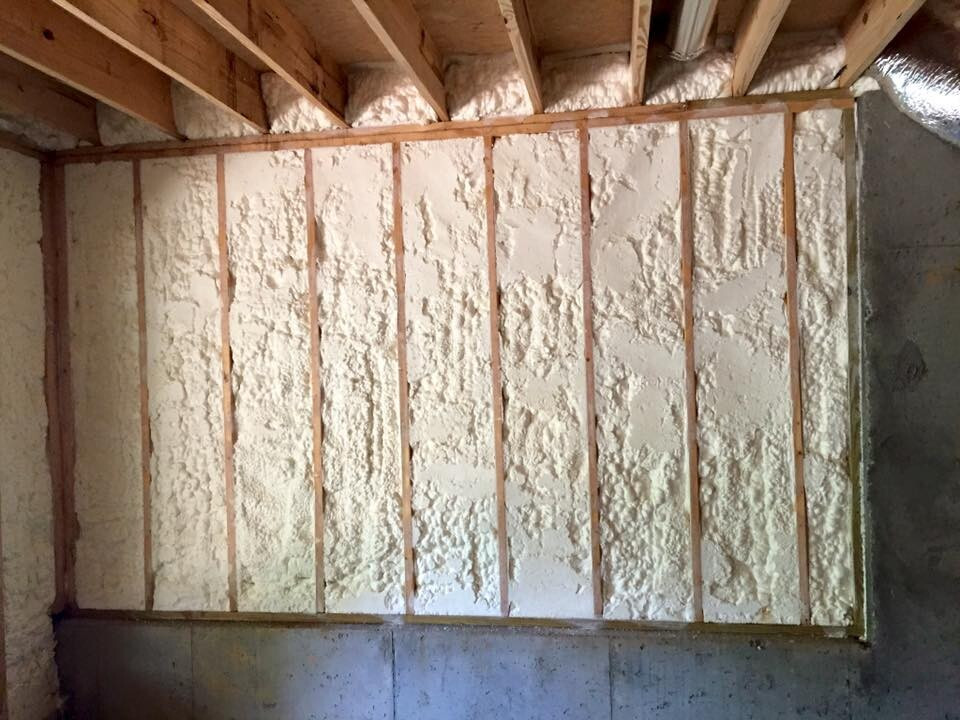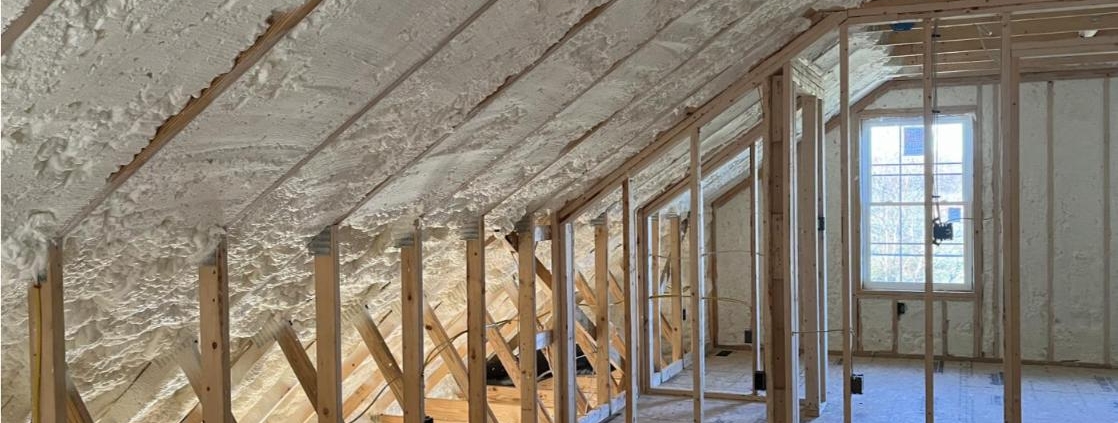How Choosing Spray Foam Insulation Can Save You Money in the Long Run in Benton, AR
For homeowners in Benton, Arkansas, the initial cost of spray foam insulation installation in Benton, AR can seem higher than traditional options like fiberglass. However, looking past the upfront price reveals that spray foam is a smart financial investment that saves a significant amount of money over the long run. The long-term savings come from three main areas: a dramatic and permanent reduction in monthly energy bills, the prevention of costly moisture-related repairs, and a longer lifespan for the home’s expensive HVAC equipment. It’s a classic case of investing in a high-performance solution that pays for itself over time.
This article will explore these three key areas of savings, explaining how the unique properties of spray foam create a more efficient and durable home. The information is based on established principles of building science and the practical experience of insulation professionals working with the specific climate challenges of Central Arkansas.
Drastic and Permanent Reductions in Energy Bills
The most direct way spray foam saves money is by cutting down monthly heating and cooling costs. In Benton’s hot and humid climate, air conditioning is the biggest part of a home’s energy budget. The key to reducing this cost is to stop the two main ways that heat enters a home: through conduction (heat passing through materials) and air leakage (hot air infiltrating through cracks and gaps).
Spray foam excels at stopping both. It has a high R-value, which is a measure of its resistance to heat conduction. But its real advantage is its ability to create a complete air seal. Unlike fiberglass batts, which are placed into wall cavities and can leave small gaps, spray foam is applied as a liquid and expands to fill every single crack, crevice, and imperfection. This creates a monolithic air barrier that can reduce a home’s air leakage by a huge margin. The Department of Energy estimates that air leakage can be responsible for up to 40% of a home’s heating and cooling costs. By drastically reducing this leakage, spray foam directly cuts down on the energy needed to keep a home comfortable, with many homeowners reporting savings of up to 40% or more on their utility bills.
Bonus Tip: For homeowners in Benton, a great way to maximize these savings is to use spray foam to create a “conditioned” or unvented attic. By applying the foam to the underside of the roof deck, the attic is brought inside the home’s thermal envelope. This keeps the attic much cooler in the summer, which significantly reduces the heat radiating down into the living space.

Beyond just managing temperature, a complete air seal also defends the home against another major challenge in the Benton climate: humidity.
Preventing Costly Moisture-Related Damage
The climate in Benton is not just hot; it’s also very humid. This moisture in the air can be a major threat to a home’s structure if it’s not properly managed. When warm, moist air from outside gets into a wall cavity and comes into contact with a cool, air-conditioned surface, it can condense into liquid water. This moisture can lead to a host of expensive problems, including:
- Mold and mildew growth, which can require costly remediation.
- Wood rot in the framing of the house.
- A reduction in the effectiveness of traditional insulation like fiberglass, which loses its R-value when it gets damp.
Closed-cell spray foam is a powerful tool for preventing these issues because it acts as a vapor barrier. This means it is impermeable to moisture. When applied to a home’s walls or foundation, it creates a seamless barrier that stops humid air from infiltrating the structure. By keeping the building assembly dry, it prevents the conditions that lead to mold, rot, and decay, saving homeowners from the massive potential cost of these types of repairs down the road.
A Long-Term Financial Comparison of Insulation Types
| Financial Factor | Traditional Fiberglass | Spray Foam Insulation |
|---|---|---|
| Initial Cost | Lower | Higher |
| Monthly Energy Savings | Moderate | High (up to 40% or more) |
| HVAC Lifespan | Standard | Extended due to reduced workload |
| Risk of Moisture Damage | Higher (can hold moisture) | Lower (closed-cell foam blocks moisture) |
| Lifespan of Insulation | Can degrade or settle over 15-20 years | Lasts for the life of the building |
| Overall Long-Term Cost | Lower initial cost is often offset by higher energy bills and future repair costs. | Higher initial cost is recouped over time through major energy savings and avoided repairs. |
Protecting the home’s structural integrity from moisture also directly benefits the most expensive piece of equipment running inside it.
Extending the Life of Your HVAC System
An HVAC system is one of the most expensive single components in a modern home, and replacing one can cost thousands of dollars. An investment in spray foam insulation is also an investment in the longevity of this critical system.
An HVAC unit in a home with poor insulation and high air leakage has to work incredibly hard, especially during a hot Arkansas summer. It runs for long periods, cycling on and off constantly to try and keep up with the heat that is continuously entering the house. This constant workload puts a huge amount of wear and tear on the compressor, the fans, and all the other mechanical parts of the system.
In a home that has been properly air-sealed and insulated with spray foam, the HVAC system’s job becomes much easier. The house holds its temperature for a much longer time, so the unit runs for shorter periods and cycles on and off far less frequently. This dramatic reduction in run time means less wear and tear, which directly translates to a longer operational lifespan for the equipment. By helping an expensive HVAC system last for several extra years, spray foam provides another significant long-term financial benefit.

Bonus Tip: When creating a conditioned attic with spray foam, the ductwork is also brought into a much more temperate environment. Ducts in a traditional attic are exposed to extreme heat, which makes them less efficient. In a conditioned attic, the ducts are in a space that is close to the temperature of the house, which further reduces the workload on the HVAC unit.
Things to Consider Before Making a Decision
While the long-term savings are clear, homeowners in Benton should consider a few key factors before investing in spray foam.
- Understand the Payback Period: The time it takes for the energy savings to pay back the initial investment can vary depending on the home’s size, its original condition, and local energy costs. A professional contractor can often help estimate this.
- Choose the Right Type of Foam: Open-cell foam is a great air barrier and is more affordable, while closed-cell foam provides a higher R-value and a moisture barrier. The right choice depends on the specific application (e.g., walls vs. crawl space).
- Hire a Qualified Professional: The performance and safety of spray foam are entirely dependent on it being installed correctly. It is critical to hire an experienced, certified, and insured contractor.
- It’s Part of a Whole-House System: For the best results, spray foam should be considered as part of a whole-house approach that also includes proper ventilation and high-performance windows and doors.
Frequently Asked Questions
How much money can I really expect to save each month?
While every home is different, it is not uncommon for homeowners who upgrade from old, poor insulation to a complete spray foam system to see their heating and cooling costs cut by 40% or even more. For many families in Benton, this can translate to hundreds of dollars in savings per year.
Is spray foam insulation eligible for any tax credits or rebates?
Energy efficiency tax credits and local utility rebates can change from year to year. It is a good idea to check the federal ENERGY STAR program website and with your local electric utility to see what incentives are currently available for insulation upgrades.
Does spray foam increase a home’s resale value?
Yes, it can. A home that is documented to have low energy bills is a very attractive asset to modern homebuyers. An investment in high-performance spray foam insulation is an upgrade that can be highlighted as a premium feature when it comes time to sell.
Can I install spray foam myself to save money?
No. Spray foam is a complex chemical product that is manufactured on-site. It requires specialized equipment and extensive safety training to be installed correctly. A DIY installation is dangerous and will almost certainly not perform as expected, which would eliminate any potential long-term savings.
Is open-cell or closed-cell foam a better investment?
It depends on the goal. Open-cell is less expensive and is an excellent air barrier and soundproofer, making it a great choice for walls and attics. Closed-cell is more expensive but provides a higher R-value and a moisture barrier, making it the superior choice for foundations, crawl spaces, and any area where moisture is a concern.
An Investment in Long-Term Value
Choosing a spray foam insulation professional is a decision to invest in a home’s long-term performance and value. While the initial cost is a factor, the significant and lasting savings on energy bills, the prevention of costly moisture damage, and the extended life of expensive HVAC equipment make it a financially sound choice for homeowners in Benton. It’s a home improvement that pays you back month after month, for years to come.
Get a Professional Assessment of Your Home’s Potential Savings
To get a clear idea of how much money spray foam could save you in your specific home, the best first step is to get a professional evaluation. An experienced insulation contractor can assess a property’s current condition and provide a detailed estimate of the potential savings. For homeowners in the Benton area, a team like LMC Insulation can offer a comprehensive consultation. They can be reached to schedule an inspection at their email, michaud@lmcinsulation.com, or by phone at (479) 351-6175.
This article was reviewed for accuracy by Mia Clark, an insulation professional with 9 years of experience in the spray foam industry.


Leave a Reply
Want to join the discussion?Feel free to contribute!